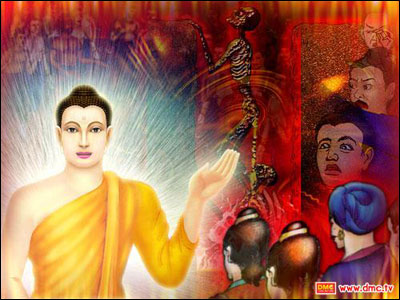Question:
I heard
Luang Phaw talk about Sila Vata (religious or monastic precepts). What are they? How are they different from the 5 precepts?

Answer
by Venerable Dhattajeevo Bhikku
What are the Sila Vata? How are they different from the 5 precepts?
At first,
Sila Vata are the precepts that emphasize the monk’s precepts which are
different from people who only maintain 5 precepts.
You understand the 5 precepts already. Normally people only maintain the 5
precepts. It’s enough for them. But for a person about to ordain as a monk, a
person who will do away with all his defilements, 5 precepts are
inadequate. He must maintain the Sila
Vata, precepts beyond the 5 precepts. What are the Sila Vata? I will
discuss those momentarily. Consider this
first.
Why is it necessary to distinguish between the precepts for
common people and the precepts for those who will ordain?
Soldiers have two levels at which they perform good
deeds. When an enemy attacks, the
goodness, the thing a soldier will do first is to defend his group, his army, his
men’s lives. He must do this first. He cannot let the enemy destroy these
things. In simple terms, he must defend
his borders, his country. Even if he
cannot destroy his enemies, he cannot allow the enemy to trespass onto his
territory. This is goodness for a
soldier, a soldier’s decency. He must
maintain his base, though this is only goodness at a basic level.
So what is the higher level of goodness for a soldier? When a soldier has the opportunity to invade
the enemy’s lands, to annihilate and demolish his enemy, to take over large
amounts of his enemy’s territory, to eliminate his enemy completely, this is
the higher level of goodness for a soldier. Is this clear?
So we are the same way. Keeping the 5 precepts as we do on typical days counts as goodness at
the basic level for people. We hold off
the defilements. We do not let them put
pressure on us.
On Buddhist days, for some people the day before and for
others the day itself, we want to perform good deeds like a monk. Why do monks ordain? They ordain to drive out, to attack and
eliminate their defilements completely. These people are copying their teachers. On the day before a Buddhist day, on the day itself, for at least that
day, or 8 days, or 15 days, or whatever number of days, they maintain the Sila
Vata like Luang Phaw.
How do you do this, go from 5 to 8 precepts?
What is the sixth precept? After 12 noon, we do not consume any food. At most we drink a little bit of a beverage. This is enough. For what reason? Because it is considered that 2 meals daily
are enough for us to live. As for the
third meal, if we chant, pray, maintain the precepts, and meditate, we do not
use much energy. So 2 meals are enough.
So what is the seventh precept? A person cannot dance or sing. A person cannot use makeup on the eyes, put
on lipstick, or use cosmetics on the face. A person cannot watch a play, soap opera, movie, musical, or any other
type of performance. This precept keeps
our minds from becoming distracted. Every
time we watch these things, even though the man lacks good looks, he still wants
to become an actor. It is like this
every time he sees an actor. Women
also. Even when they are not attractive,
they watch plays, shows, movies, and they start to think they can be actresses. Their minds are distracted. Therefore, no more. Stay away from these things.
What is the eighth precept? Do not sleep on thick, soft bedding. Do not do this. Your mind will be
distracted easily. When we maintain the
sixth, seventh, and eighth precepts, it helps keep our minds from
distraction. This is especially true for
teenagers. They are easily distracted by
sexual matters. Lust arises easily in
teenagers. As a result, when our
grandparents and great-grandparents reach the right age, they start to go to
the temple. They maintain the precepts
easily. When the oldest child marries,
whether it is a daughter or a son that gets married, the parents quickly enter
the temple and maintain the 8 precepts.
Why? Because they are
preparing to be grandparents. They must
be examples of ethical behavior for their children to see.
So beyond adding the sixth, seventh, and eighth precepts, the
third precept, part of the 5 precepts, says “Be satisfied with your
spouse. Do not commit adultery.” When a person maintains the 8 precepts, the Sila
Vata, he/she is bringing this third precept to a higher level. Even though he/she has a spouse, he/she does
not sleep with his/her spouse. He/she
behaves like a monk, like Luang Phaw, he copies Luang Phaw. He/she is ready? How is he/she ready? He/she is prepared to ordain with Luang
Phaw. This is the Sila Vata.
What are the Sila Vata? They are the precepts intended to conquer the defilements. They are not just the 5 precepts which hold
the defilements at bay. If you ask how
they differ from one another. The 5
precepts repel the defilements. The Sila
Vata demolish the defilements so that nothing remains of them.


